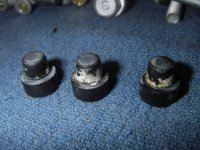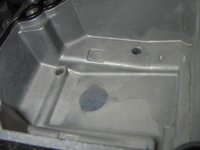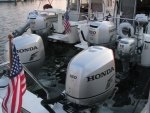With regard to the question about diesel outboard motors:
There is a military program called "One Fuel Forward" which mandates that all military motors used in the field be able to run #2 diesel and heavy fuels such as JP-5 and JP-8. See:
http://www.globalsecurity.org/military/ ... y/opa3.pdf
Page 83 (of 449) of this document mentions the M359 35hp diesel outboard motor, but I cannot find it using Google.
The "Maritime Engineering Group" has videos up on Youtube about a 3.0 liter turbodiesel outboard motor. See:
http://www.youtube.com/watch?v=-MUeWgGATSM
http://www.youtube.com/watch?v=Sk83NoFx ... re=related
http://www.megoutboard.com/
The specifications are as follows:
Vision 3.0L Specifications
Max RPM (WOT) - 4,000
Cylinder/Configuration - Inline 4-Cylinder, 16-Valve Direct Acting Double Overhead Cam (DOHC)
Displacement - 3.0 Liter
Fuel System - Common Rail
Fuel Requirements - Diesel
Charging System - Fully regulated belt-driven 50-amp (600 watt)
Starting - Electric 12 Volt
Exhaust System - Through Prop
Cooling System - Water-Cooled w/Thermostat & Pressure Control
Lubrication System - Integrated Dry Sump
Oil Capacity - 8 Quarts
Engine Control System - Digital
Gear Ratio - 1.62
Shaft Length - 20/25/30 inches
Counter Rotation - Available
Weight - 723 lbs (Pre-Production)
Certification - EPA Tier 2
Key Features:
Three Different Power Levels Available.
Similar Performance to 175hp, 225hp or 300hp Gasoline Four-stroke Engines (depending on power level).
Uses 6, 8 or 11 Gallons of Fuel Per Hour @ Rated Power (Depending on power level).
Production Starting Early 2009
Patent Pending
Cost of ownership versus a 300hp gasoline outboard:
Complete Cost of Ownership
(Purchase Cost of Engine Not Included)
Vision Diesel 3.0L Comparable 300HP
4-stroke GAS engine
Hours Used 1000 1000
Fuel Flow per hour (GPH) 11 26
Total Fuel Consumed (GALLONS) 11,000 26,000
Cost of Fuel per gallon $3.50 $3.50
Total Fuel Price $35,000.00 $91,000.00
100 Hour Service $485.00 $705.00
Total Cost of 100 Hour Services $4,850.00 $7,050.00
TOTAL COST FOR
1000 Hours of Service $39,850.00 $98,050.00
Difference In Cost (SAVINGS) $58,200.00
Seems like both too heavy and power overkill for a C-Dory...
Best regards,
There is a military program called "One Fuel Forward" which mandates that all military motors used in the field be able to run #2 diesel and heavy fuels such as JP-5 and JP-8. See:
http://www.globalsecurity.org/military/ ... y/opa3.pdf
Page 83 (of 449) of this document mentions the M359 35hp diesel outboard motor, but I cannot find it using Google.
The "Maritime Engineering Group" has videos up on Youtube about a 3.0 liter turbodiesel outboard motor. See:
http://www.youtube.com/watch?v=-MUeWgGATSM
http://www.youtube.com/watch?v=Sk83NoFx ... re=related
http://www.megoutboard.com/
The specifications are as follows:
Vision 3.0L Specifications
Max RPM (WOT) - 4,000
Cylinder/Configuration - Inline 4-Cylinder, 16-Valve Direct Acting Double Overhead Cam (DOHC)
Displacement - 3.0 Liter
Fuel System - Common Rail
Fuel Requirements - Diesel
Charging System - Fully regulated belt-driven 50-amp (600 watt)
Starting - Electric 12 Volt
Exhaust System - Through Prop
Cooling System - Water-Cooled w/Thermostat & Pressure Control
Lubrication System - Integrated Dry Sump
Oil Capacity - 8 Quarts
Engine Control System - Digital
Gear Ratio - 1.62
Shaft Length - 20/25/30 inches
Counter Rotation - Available
Weight - 723 lbs (Pre-Production)
Certification - EPA Tier 2
Key Features:
Three Different Power Levels Available.
Similar Performance to 175hp, 225hp or 300hp Gasoline Four-stroke Engines (depending on power level).
Uses 6, 8 or 11 Gallons of Fuel Per Hour @ Rated Power (Depending on power level).
Production Starting Early 2009
Patent Pending
Cost of ownership versus a 300hp gasoline outboard:
Complete Cost of Ownership
(Purchase Cost of Engine Not Included)
Vision Diesel 3.0L Comparable 300HP
4-stroke GAS engine
Hours Used 1000 1000
Fuel Flow per hour (GPH) 11 26
Total Fuel Consumed (GALLONS) 11,000 26,000
Cost of Fuel per gallon $3.50 $3.50
Total Fuel Price $35,000.00 $91,000.00
100 Hour Service $485.00 $705.00
Total Cost of 100 Hour Services $4,850.00 $7,050.00
TOTAL COST FOR
1000 Hours of Service $39,850.00 $98,050.00
Difference In Cost (SAVINGS) $58,200.00
Seems like both too heavy and power overkill for a C-Dory...
Best regards,



